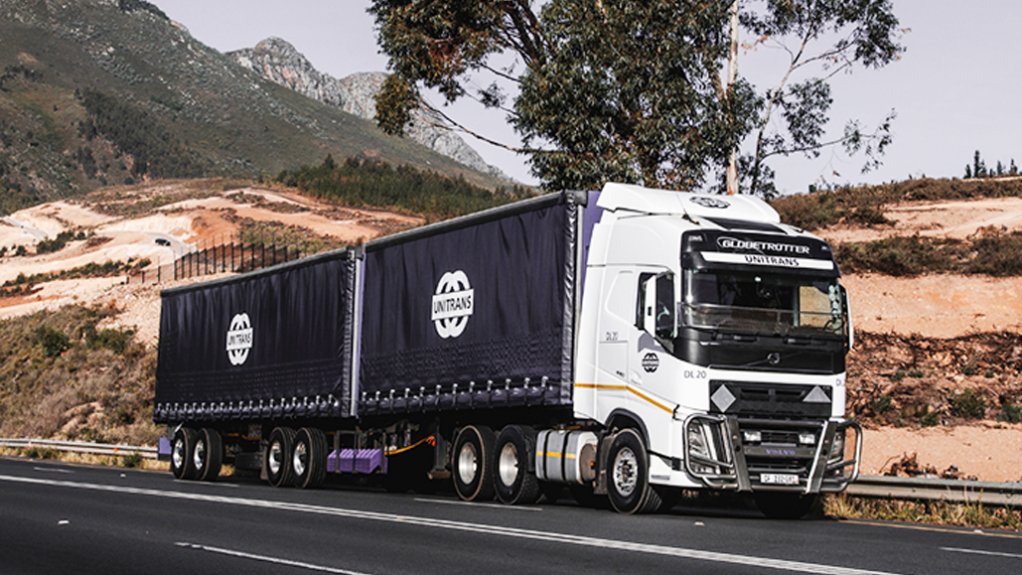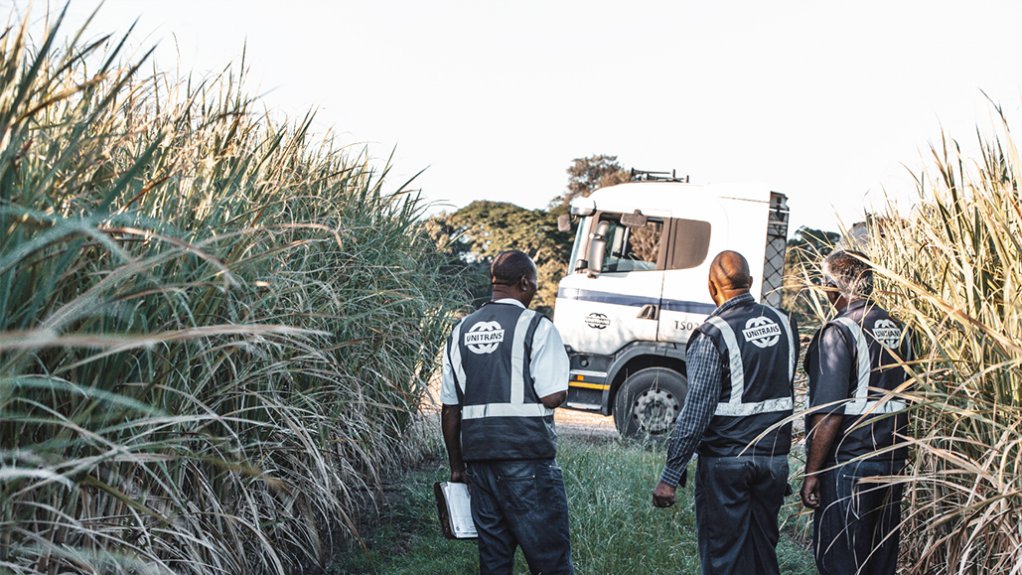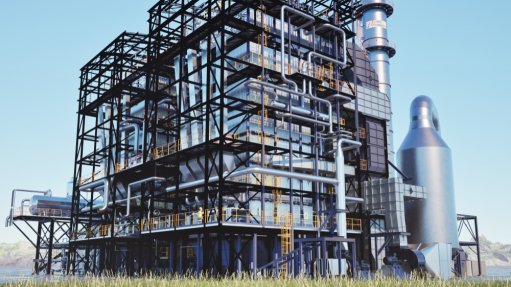Unitrans positive about govt, private-sector intervention amid transport crises
Despite the deterioration of South Africa’s aging transport infrastructure and a challenging operating environment, end-to-end logistics and supply chain solutions provider Unitrans CEO Edwin Hewitt is hopeful about the future of supply chain management and logistics in South Africa, emphasising the value of data-driven decision-making.
Hewitt is an advisor to Ian Bird, the senior executive responsible for the transport and logistics focal area at Business for South Africa (B4SA), an alliance of South African business leaders. B4SA, in turn, advises the National Logistics Crisis Committee established in June 2023 by government to address the country’s rail, port and road crises.
“There's currently enough will and intent for government and the private sector to join hands and find a solution to the challenges that we face in the supply chain industry. As a country we need to mobilise additional funding and resources to deliver key tangible outcomes.
“The challenges Unitrans faces are the same for everybody. There are structural challenges, macroeconomic challenges and infrastructure challenges, but we are a very resilient country, and resourceful people, and we will overcome these challenges to find solutions.”
Unitrans and its holding company, KAP Group, are actively involved in advising government, and participating in advisory committees and industry associations on how to address these challenges and guide policy changes that enable a more sustainable industry, says Hewitt.
THE CLIMATE CHALLENGE
A company’s success is not only defined by its financial well-being, he emphasises, with environmental, social and governance (ESG) factors, such as climate change, impacting on a business’ sustainability in the current operating environment.
“Climate change is the responsibility of business, and companies in the logistics and supply chain space must contribute and address their impact on achieving a low carbon economy. We operate in an ecosystem with multiple interdependencies. Emissions are an important aspect that must be factored into how we operate.”
While there are multiple technologies, including Euro 6 trucks, that can be implemented to reduce emissions in the logistics and supply chain industry, Unitrans also applies data and data technology to track and monitor its vehicles and observe driver behaviour.
“In so doing, we can improve driver behaviour to mitigate speeding and harsh braking to further reduce fuel consumption and carbon emissions of our diesel-driven fleet. We all aspire to using alternative fuel vehicles, but people underestimate the significant expense involved in installing infrastructure to charge these vehicles. A high-speed charger for an electrical truck today requires a R1-million investment,” notes Hewitt.
The company has, however, invested in alternative technologies at its warehouses and offices, installing solar power panels and inverters to reduce its dependence on the national grid, which is still predominantly distributing coal-fired power.
Unitrans is aware of the impact that climate change is having on various industries, especially the agriculture industry, which is one of the largest industries it services. A significant player in sugar estate management and farming, the company services major operations. Therefore, it is familiar with the impacts of adverse weather conditions, such as that experienced in Mozambique of late, and the importance of addressing climate change.
Severe weather events not only affect those operations’ ability to produce and export product but also the people who work on those farms, highlights Hewitt.
DATA DRIVEN
Unitrans provides a centralised source of supply chain intelligence, enabling its clients to make informed decisions, which is vital in today’s operating environment.
“We are committed to reducing carbon emissions and have a dedicated department reviewing data. This is in addition to having set targets to help limit our impact on climate change.
“We are a data-driven organisation. We have the tools, skills and experience to convert that data and analyse it. From that analysis, we can design or propose alternative supply chains.”
For example, data can be combined with optimisation tools to design an alternative routing for trucks driving in a large network. More important, says Hewitt, is integrating available data with that of other players in the industry to optimise the network.
Safety and risk management are also key.
“We invest heavily in in-cab technology. We have a telematics system that provides us with data on driver behaviour. And we also have access to sister company, driver behaviour management and fleet optimisation solutions provider Optix’s DriveCam technology.
“The camera systems generate millions of reams of data from Lytx in the US, where they measure driver behaviour. If a driver nods off or is not wearing a safety belt, these incidents are recorded to allow for fatigue management and coaching and heightens safety awareness,” explains Hewitt, adding that Unitrans also uses technologies such as the MiX Vision in-cab video solution.
Working for multinational companies, Unitrans’ health and safety, and ESG standards must comply with their requirements. Data is also used to inform better decisions regarding demand and demand balance forecasting.
Hewitt says this improved decision-making ultimately translates into a more cost-efficient and safer operations.
“Not only are we safe but we also become a more efficient organisation by changing our driver behaviour and informing our actions through data, improving our returns to our shareholders while navigating currency and fuel price volatility, as well as commodity cycles.”
However, with many smaller players having entered the industry, it has become fragmented.
“Those players have also entered the industry at a certain price point. In so doing, they service many of the large corridors, such as the N1 and N3, that we operate in, at a significantly reduced price. As a big organisation that has higher input costs to ensure health and safety compliance and employ data technology, you struggle to compete with the smaller players. However, Unitrans is not negotiable on the quality of their services.”
While Hewitt applauds enterprise development, he says many of these smaller players are unable to install the safety, telematics and camera systems employed by larger players.
“Because we invest in technology and data, we contribute positively by enabling more efficient, safer driving. Ultimately, we do all of this, not only for our own success but also for our client’s success.”
Article Enquiry
Email Article
Save Article
Feedback
To advertise email advertising@creamermedia.co.za or click here
Press Office
Announcements
What's On
Subscribe to improve your user experience...
Option 1 (equivalent of R125 a month):
Receive a weekly copy of Creamer Media's Engineering News & Mining Weekly magazine
(print copy for those in South Africa and e-magazine for those outside of South Africa)
Receive daily email newsletters
Access to full search results
Access archive of magazine back copies
Access to Projects in Progress
Access to ONE Research Report of your choice in PDF format
Option 2 (equivalent of R375 a month):
All benefits from Option 1
PLUS
Access to Creamer Media's Research Channel Africa for ALL Research Reports, in PDF format, on various industrial and mining sectors
including Electricity; Water; Energy Transition; Hydrogen; Roads, Rail and Ports; Coal; Gold; Platinum; Battery Metals; etc.
Already a subscriber?
Forgotten your password?
Receive weekly copy of Creamer Media's Engineering News & Mining Weekly magazine (print copy for those in South Africa and e-magazine for those outside of South Africa)
➕
Recieve daily email newsletters
➕
Access to full search results
➕
Access archive of magazine back copies
➕
Access to Projects in Progress
➕
Access to ONE Research Report of your choice in PDF format
RESEARCH CHANNEL AFRICA
R4500 (equivalent of R375 a month)
SUBSCRIBEAll benefits from Option 1
➕
Access to Creamer Media's Research Channel Africa for ALL Research Reports on various industrial and mining sectors, in PDF format, including on:
Electricity
➕
Water
➕
Energy Transition
➕
Hydrogen
➕
Roads, Rail and Ports
➕
Coal
➕
Gold
➕
Platinum
➕
Battery Metals
➕
etc.
Receive all benefits from Option 1 or Option 2 delivered to numerous people at your company
➕
Multiple User names and Passwords for simultaneous log-ins
➕
Intranet integration access to all in your organisation
























